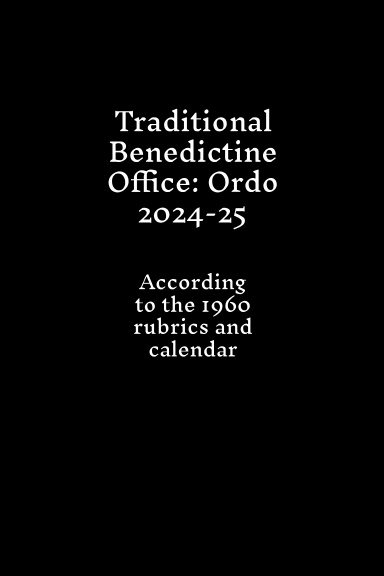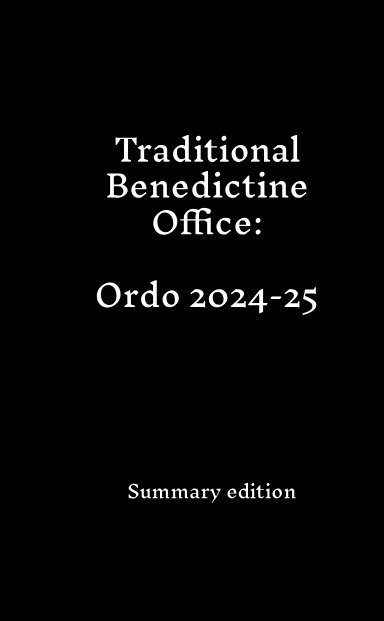As usual, the Ordo is available in paperback and ebook (PDF) formats.
About the Ordo
The Ordo basically provides detailed notes and page references to enable you to say the Benedictine Office with confidence using the (St Michael's) Monastic Diurnal (MD), Antiphonale Monasticum (AM) and (Le Barroux) Nocturnale Monasticum (NM).
It follows the 1960 rubrics and calendar (as published in the monastic breviary of 1963), but includes notes on earlier feasts and rubrics, particularly where these are employed by one or more of the monasteries still using the traditional Office and calendar.
The book includes quick reference guides giving the default pages in the Diurnal for each of the day hours; rubrical notes on the seasons; and notes for each day of the liturgical year. It includes cross-references to the Roman Extraordinary Form calendar, as well as to feasts particular to selected countries and regions.
For the week of 12 October 2025, for example, the daily notes look like this:
Sunday 12 October – Eighteenth Sunday after Pentecost/Second Sunday of October, Class II [Previously: Third Sunday of October]
Matins: All as in the psalter with responsories and Nocturn I & II readings of the Second Sunday of October, NM 548 ff; Nocturn III readings, Gospel and collect of the Eighteenth Sunday after Pentecost, NM 615-6.
Lauds to Vespers: All as for Sunday in the psalter with canticle antiphons and collect, MD 477*/AM 609-10.
Monday 13 October – Class IV [**In some places/EF: St Edward, Class III]
All as in the psalter for throughout the year with collect, MD 477*/AM 610.
Tuesday 14 October – Class IV; St Callistus, Memorial [EF: Class III]
All as in the psalter with collect, MD 477*/AM 610; for the commemoration at Lauds, MD [314]/AM 1085.
Wednesday 15 October – St Teresa, Class III
Matins: Two nocturns with invitatory antiphon of a Virgin, LH 45; one reading of the feast; responsory, chapter, versicle and collect of the feast, NM 1144-5.
Lauds: Chapter, responsory, hymn, versicle, Benedictus antiphon and collect for the feast, MD [315]/AM 1086 ff.
Prime: Antiphon 1 of Lauds of the Common of a Virgin, MD (90)/AM, 678.
Terce to None: Antiphon, chapter and versicle of the Common of a Virgin, MD (94)/AM 681 ff; collect of the feast, MD [316]/AM 1086.
Vespers: Chapter, responsory, versicle and Magnificat antiphon of the Common of a Virgin, MD (96)/AM 682-3; hymn and collect of the feast, MD [315]/AM 1086 ff.
Thursday 16 October – Class IV [**In some places, St Gall. EF: St Hedwig, Class III. Canada: St Marguerite d’Youville, Class III]
All as in the psalter with collect, MD 477*/AM 610.
Friday 17 October – Class IV [EF: St Margaret Mary Alacoque, Class III; Le Barroux: Class II; Gower: Memorial]
All as in the psalter with collect, MD 477*/AM 610.
In some monasteries: 1 Vespers of St Luke: All as in the Common of Apostles, MD (2) ff with collect of the feast, MD [317-8].
Saturday 18 October – St Luke, Evangelist, Class II
Matins: Three nocturns, all of the Common of Apostles, LR 134 ff, except for the readings (Nocturn I, Common of an Evangelist; Nocturns II & III, of the feast), Gospel and collect, NM 1149-50.
Lauds: Festal psalms with antiphons, chapter, responsory, hymn, versicle and Benedictus antiphon of the Common of Apostles, MD (9)/AM 622 ff; collect of the feast, MD [317-8]/AM 1087.
Prime: Antiphon 1 of Lauds of the Common, MD (9)/AM 622.
Terce to None: Antiphon, chapter and versicle of the Common, MD (11)/AM 625 ff; collect of the feast, MD [317-8]/AM 1087.
2 Vespers: Festal psalms with antiphons, chapter, responsory, hymn, versicle and Magnificat antiphon of the Common of Apostles, MD (13)/AM 626 ff; collect of the feast, MD [317-8]/AM 1087; commemoration of the Fourth Sunday of October/Nineteenth Sunday after Pentecost, Magnificat antiphon and versicle, MD 458-9*/AM 589; collect, MD 478*/AM 611.
Some years ago someone asked if I could produce a pocket version of the Ordo, that would fit neatly with the size of the Diurnal. Accordingly, this year I've produced a summary version of the Ordo as a trial to assess demand!
Note that it does not provide any rubrical notes, cross-references to other calendars or other support material: it essentially assumes that the reader is very familiar with the Benedictine Office, and can work things out from the basic references to pages in the Diurnal.
Here is what the same week in 2025 looks like in the pocket version:
Eighteenth week after Pentecost/Second week of October.
Ordinary of time
throughout the year (in the psalter section), default collect, MD 477*.
Sunday 12 October – Eighteenth Sunday after Pentecost/2nd Sunday of October, Class II, MD 477*.
Monday 13 October – Class IV.
Tuesday 14 October – Class IV; com of St Callistus at Lauds, MD [314].
Wednesday 15 October – St Teresa, Class III, MD [315] ff.
Thursday 16 October – Class IV.
Friday 17 October – Class IV.
Saturday 18 October – St Luke, Class II, MD [317-8]. At 2 Vespers, com of the 4th Sunday of October/19th after Pentecost antiphon, MD 458-9* & 478*.



